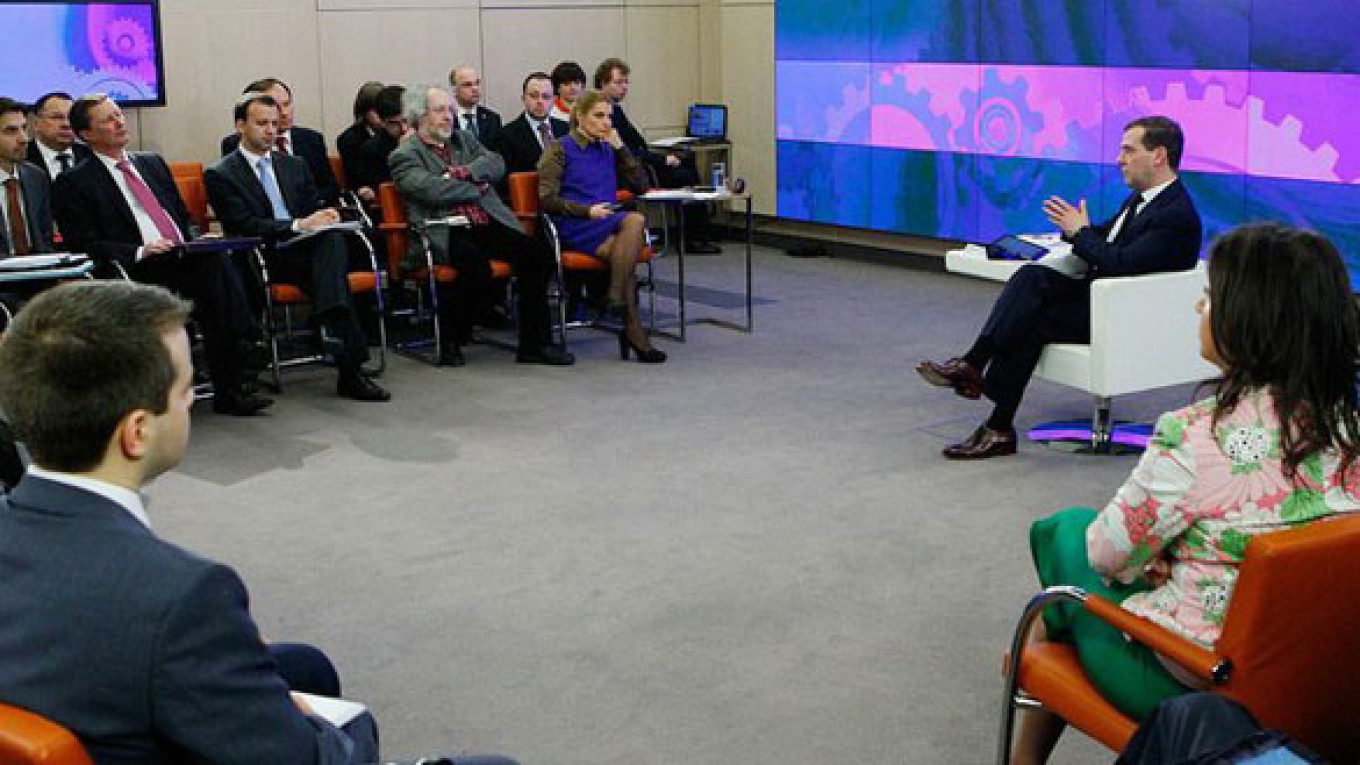President Dmitry Medvedev signed a decree Tuesday creating the first-ever public television channel in Russia that he vowed will be fully independent from the state.
"Public television can't replace the Internet, but it would be an important tool for the political class," Medvedev said.
He said he would soon appoint a head for the new independent channel, which would start broadcasting in January.
Medvedev said the existing Defense Ministry-run television channel, Zvezda, might be used as a launch pad for the new public television station.
Medvedev also said the bill reinstating direct gubernatorial elections, which is pending in the Duma, contains no provision requiring a presidential "filter" for would-be candidates from other parties to be allowed to run in elections.
Medvedev who is expected to become prime minister after President-elect Vladimir Putin's inauguration, made the announcements during a meeting of his so-called Open Government task force — a loosely knit group of senior bureaucrats, business leaders and public figures.
The task force, chaired by the head of the presidential administration Sergei Ivanov, includes presidential aide Arkady Dvorkovich, Economic Development Minister Elvira Nabiullina, a former Boris Yeltsin-era presidential administration head Alexander Voloshin and billionaire Viktor Vekselberg.
Ironically, the defense-run channel Zvezda was established in 2005 in an effort to boost the popularity of Ivanov, who then served as defense minister and was considered at the time to be a possible successor to Putin in the 2008 presidential election.
Medvedev appeared relaxed and cracked jokes with experts who addressed him casually in the meeting, which was broadcast on Rossia-1 as well as on Facebook and Vkontakte. The meeting took place in the offices of RIA-Novosti, the state-owned news wire whose chairwoman, Svetlana Mironyuk, is a task-force member.
The task force is responsible for setting up an Open Government group of experts to independently monitor governmental activities and regularly meet with the president to discuss fighting graft, staffing issues and competitive development.
While Medvedev leaves a mixed legacy in his final days in office, experts said his Open Government idea was an important effort in enlisting political support from the political class known as "system liberals."
Yaroslav Kuzminov, head of the Higher School of Economics and a task-force member, said the Open Government group should not be too "friendly" to the acting government, but should be seen more as "independent expertise" rather than a governmental watchdog.
Kuzminov said he believed that Medvedev's engagement with the group would continue and that he expected that Medvedev would become a "more political prime minister."
"It is important for him to be seen as a person who wants to continue his activity as a political figure," he said.
Medvedev has said he agrees with most of the proposals drafted by the Open Government experts, even reworking public councils at various ministries, an idea which he has criticized.
"On the federal level they all look like decorations, while on the regional level they consist of people who often couldn't make a step," he said, adding that everything depends on regional heads who often are afraid of including independent people on the councils.
But, while both Medvedev and Putin were blamed by opponents for nominating loyalists as regional heads during their presidential terms, Medvedev said the new law on gubernatorial elections doesn't include any filters from the executive branch to oversee the elections of governors.
He was responding to the question from liberal task-force member and Ekho Moskvy radio boss Alexei Venidiktov who asked Medvedev to provide some clarity on the law.
"Over the last 20 years, authorities have been reluctant to provide an explanation of their actions to the public," Venediktov said.
Medvedev said he agreed that it was a problem that remains the "biggest weakness for the government."
But while Medvedev has said the Open Government will remain open to opposition-minded experts, he also said he doesn't see the current Russian protest movement as a united force.
"It is more of a set of moods that every one of us should take into account," Medvedev said. "Authorities can only communicate with those who want to communicate. They can't force anyone to do that."
A Message from The Moscow Times:
Dear readers,
We are facing unprecedented challenges. Russia's Prosecutor General's Office has designated The Moscow Times as an "undesirable" organization, criminalizing our work and putting our staff at risk of prosecution. This follows our earlier unjust labeling as a "foreign agent."
These actions are direct attempts to silence independent journalism in Russia. The authorities claim our work "discredits the decisions of the Russian leadership." We see things differently: we strive to provide accurate, unbiased reporting on Russia.
We, the journalists of The Moscow Times, refuse to be silenced. But to continue our work, we need your help.
Your support, no matter how small, makes a world of difference. If you can, please support us monthly starting from just $2. It's quick to set up, and every contribution makes a significant impact.
By supporting The Moscow Times, you're defending open, independent journalism in the face of repression. Thank you for standing with us.
Remind me later.


